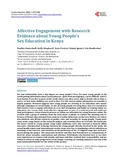| dc.contributor.author | Oosterhoff, Pauline | |
| dc.contributor.author | Shephard, Kelly | |
| dc.contributor.author | Peeters, Arno | |
| dc.contributor.author | Igonya, Emmy | |
| dc.contributor.author | Honderdos, Iris | |
| dc.coverage.spatial | Kenya | en |
| dc.date.accessioned | 2016-07-22T12:32:17Z | |
| dc.date.available | 2016-07-22T12:32:17Z | |
| dc.date.issued | 2016-07-01 | |
| dc.identifier.citation | Oosterhoff, P. , Shephard, K. , Peeters, A. , Igonya, E. and Honderdos, I. (2016) Affective Engagement with Research Evidence about Young People’s Sex Education in Kenya. Creative Education, 7, 1572-1581. doi: 10.4236/ce.2016.711162. | en |
| dc.identifier.uri | https://opendocs.ids.ac.uk/opendocs/handle/20.500.12413/12119 | |
| dc.description.abstract | Sex and relationships have a big impact on young people’s lives. For most young people in the world getting information about sexual pleasure, apart from pornography, can be difficult. And it’s even harder if you live in parts of the world where you often aren’t able to decide who to date or marry, or how many children you want to have. For this reason online information on sexuality is hugely popular. Research suggests that young people are arriving at sex education sites mostly through campaigns on social media. As not all young people are using these sites it is essential to find creative ways to engage with them in a way that strengthens and builds on existing online sex education. Our recent study used affective engagement as part of a multi-layered and multi-me- thod participatory action research process on online sex education for young Kenyans online. We worked with a group of students from the Sauti music academy, to explore the meaning and relevance of themes that emerged from analysis of online behaviour on the Love Matters sex education platform and off-line research on gender roles and sexuality by young people. Young musicians wrote songs based on the research analysis and recorded these on YouTube. We found that the issues raised by young people using online platforms were also relevant to Kenyan offline non-users. Interpersonal exchange between the young people directly involved in the study, the sexual health experts and international creative team were key to stimulating critical reflection on meanings of sex and love, and creativity in the production of the 15 original songs that were produced during the project. The musicians involved said they had learned how to communicate effectively about sexuality, expectations and affection. Participants also learned how to use their own experiences to connect with people, and most said they realized their responsibility and potential as artists to make progressive social change. Learning on reaching audiences was one of the main unintended benefits for the artists of this project. | en |
| dc.language.iso | en | en |
| dc.publisher | Scientific Research | en |
| dc.relation.ispartofseries | Creative Education;7 | |
| dc.rights | Copyright © 2016 by authors and Scientific Research Publishing Inc. This work is licensed under the Creative Commons Attribution International License (CC BY). http://creativecommons.org/licenses/by/4.0/ | en |
| dc.rights | Attribution 2.0 UK: England & Wales | * |
| dc.rights.uri | http://www.ids.ac.uk/files/dmfile/IDSOpenDocsStandardTermsOfUse.pdf | en |
| dc.rights.uri | http://creativecommons.org/licenses/by/2.0/uk/ | * |
| dc.subject | Sexuality and Development | en |
| dc.title | Affective Engagement with Research Evidence about Young People’s Sex Education in Kenya | en |
| dc.rights.holder | Scientific Research | en |
| dc.identifier.externaluri | http://www.scirp.org/Journal/PaperInformation.aspx?PaperID=68787 | en |
| dc.identifier.team | Knowledge Services | en |
| dc.identifier.doi | 10.4236/ce.2016.711162 | |
| rioxxterms.funder | Default funder | en |
| rioxxterms.identifier.project | Default project | en |
| rioxxterms.version | VoR | en |
| rioxxterms.funder.project | c941507f-fd0b-4fc3-9822-4b2132f61a1d | en |

